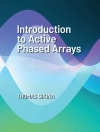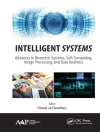This volume contains 73 papers presented at ICMEET 2015: International Conference on Microelectronics, Electromagnetics and Telecommunications. The conference was held during 18 – 19 December, 2015 at Department of Electronics and Communication Engineering, GITAM Institute of Technology, GITAM University, Visakhapatnam, INDIA. This volume contains papers mainly focused on Antennas, Electromagnetics, Telecommunication Engineering and Low Power VLSI Design.
Зміст
Chapter 1. Subthreshold Operation of Energy Recovery Circuits.- Chapter 2. Design and Analysis of a Low cost, Flexible Soft Wear Antenna for an ISM Band working in Different Bending Environment.- Chapter 3. Bandwidth Enhanced Nearly Perfect Metamaterial Absorber for K-band Applications.- Chapter 4. An Approach to Improve the Performance of FIR Optical Delay Line Filters.- Chapter 5. Development of a VLSI Based Real-time System for Carcinoma Detection and Identification.- Chapter 6. A Novel Frequency-Time Based Approach for the Detection of Characteristic Waves in Electrocardiogram Signal.- Chapter 7. A Long Signal Integrator for Fusion Device Using Arm Controller.- Chapter 8. Performance Analysis of Frequency Dependent and Frequency Independent Microstrip Patch Antennas.- Chapter 9. Implementation of Gait Recognition for Surveillance Applications.- Chapter 10. Comparative Analysis of HVS Based Robust Video Watermarking Scheme.- Chapter 11. Development of Microstrip Triple – Band Filter Using Hybrid Coupling Path Approach.- Chapter 12. Security Issues in Cognitive Radio: A Review.- Chapter 13. GPS C/A Code Multipath Error Estimation for Surveying Applications in Urban Canyon.- Chapter 14. Qo S Discrepancy Impact (QDI) and Cohesion between Services (CBS): Qo S Metrics for Robust Service Composition.- Chapter 15. Low Power and Optimized Ripple Carry Adder and Carry Select Adder Using MOD-GDI
Technique.- Chapter 16. Increasing the Lifetime of Leach Based Cooperative Wireless Sensor Networks.- Chapter 17. A U-Shaped Loop Antenna for In-body Applications.- Chapter 18. Design of NMEA2000 CAN Bus Integrated Network System and Its Test Bed: Setting Up the PLC System in Between Bridge – Bow Room Section on a Container Ship as a Backbone System.- Chapter 19. Inductively Powered Underground Wireless Communication System.- Chapter 20. Load Flow Analysis of Uncertain Power System through Affine Arithmetic.- Chapter 21. Advanced Parallel Structure Kalman Filter for Radar Applications.- Chapter 22. Performance of Fusion Algorithm for Active Sonar Target Detection in Underwater Acoustic Reverberation Environment.- Chapter 23. Investigation of Optimum Phase Sequence for Reduction of PAPR using SLM in OFDM System.- Chapter 24. Optimization of Peak to Average Power Ratio Reduction Using Novel Code for OFDM Systems.- Chapter 25. Scattering of SODAR Signal through Rough Circular Bodies.- Chapter 26. Mitigation of Fault in 5 Bus System with Switch Type Voltage Controlled FCL.- Chapter 27. Energy Efficiency in Cognitive Radio Network: Green Technology towards Next Generation Networks.- Chapter 28. Performance Evaluation of Rectangular Enclosure for any Arbitrary Polarization Angle.- Chapter 29. PAPR Reduction in SFBC OFDM System – MCMA Approach.- Chapter 30. Reduction of Mutual Coupling Effect in Adaptive Arrays.- Chapter 31. Parameter Estimation of Solid Cylindrical Electromagnetic Actuator Using Radial Basis Function Neural Networks.- Chapter 32. An Efficient Audio Watermarking Based on SVD and Cartesian-Polar Transformation with Synchronization.- Chapter 33. A Proposal for Packet drop Attacks in MANETS.- Chapter 34. Heptagonal Fractal Antenna Array for Wireless Communications.- Chapter 35. Multiplexer Based 2’s Complement Circuit for Low Power and High Speed Operation.- Chapter 36. Robust Hybrid Video Watermarking using SVD & DTCWT.- Chapter 37. Efficiency Comparison of MWT and EWT all Back Contact Nanowire Silicon Solar Cells.- Chapter 38. Simulation of Electrical Characteristics of Silicon and Germanium Nanowires Progressively Doped to Zener Diode Configuration Using First Principle Calculations.- Chapter 39. An Embedded Visually Impaired Reconfigurable Author Assistance System Using Lab View.- Chapter 40. Estimation of RCS for a Perfectly Conducting and Plasma Spheres.- Chapter 41. Fault-Tolerant Multi-core System Design Using PB Model and Genetic Algorithm Based Task Scheduling.- Chapter 42. Investigation of Suitable Geometry Based Lonospheric Models to Estimate the Lonospheric.- Parameters Using the Data of a Ground Based GPS Receiver.- Chapter 43. A Novel Proposal of Artificial Magnetic Conductor Loaded Rectangular Patch Antenna for Wireless Applications.- Chapter 44. Design of Dual Band Labyrinth Slotted Rectangular Patch Antenna for X-band Applications.- Chapter 45. Implementation and Analysis of Ultra Low Power 2.4GHz RF CMOS Double Balanced Down Conversion Subthreshold Mixer.- Chapter 46. TDMA Based Collision Avoidance in Dense and Mobile RFID Reader Environment: DDFSA with RRE.- Chapter 47. Perturbed Elliptical Patch Antenna Design for 50GHz Application.- Chapter 48. Design of an Analog Fault Model for CMOS Switched Capacitor Low Pass Filter.- Chapter 49. Image Authentication Using Local Binary Pattern on the Low Frequency Components.- Chapter 50. An Adaptive Filter Approach for GPS Multipath Error Estimation and Mitigation.- Chapter 51. Generation of Optimized Beams from Concentric Circular Antenna Array with Dipole Elements Using BAT Algorithm.- Chapter 52. Design and Analysis of Single Feed Dual Band Stacked Patch Antenna for GPS Applications.- Chapter 53. Emotion Recognition Model Based on Facial Gestures and Speech Signals Using Skew Gaussian Mixture Model.- Chapter 54. Analysis and Detection of Surface Defects in Ceramic Tile Using Image Processing Techniques.- Chapter 55. Lifeline System for Fisherman.- Chapter 56. Characterisation of Mobile Radio Channel.- Chapter 57. Implementation of Reversible Arithmetic and Logical Unit and Its Bilbo Testing.- Chapter 58. Evaluation of Radiation Characteristics of Dipolesin: The Presence of Earth.- Chapter 59. Non-uniform Circular Array Geometry Synthesis Using Wind Driven Optimization Algorithm.- Chapter 60. Implementation of ISAR Imaging with Step Frequency and LFM Waveforms Using Gabor Transform.- Chapter 61. Design of Low Power and High Speed Carry Look Ahead Adder ( CLAA ) Based on Hybrid CMOS Logic Style.- Chapter 62. TSPC Based Dynamic Linear Feedback Shift Register.- Chapter 63. Design of Wideband Planar Printed Quasi-Yagi Antenna Using Defected Ground Structure.- Chapter 64. ECG Signal Pre-processing Based on Empirical Mode Decomposition.- Chapter 65. Design and Analysis of Magnetic Lenses for High Energy Proton Accelerators.- Chapter 66. Skeletonization of players in Dynamic Backgrounds Using Discrete Curve Evolution.- Chapter 67. FPGA Implementation of Test Vector Monitoring BIST Architecture System.- Weighting Multiple Features and Double Fusion Method for HMM Based Video Classification.- Chapter 69. A Suitable Approach in Extracting Brain Source Signals from Disabled Patients.- Chapter 70. Design and Analysis of Multi Substrate Microstrip Patch Antenna.- Chapter 71. Design and Analysis of Reversible Binary and BCD Adders.- Chapter 72. Magnetic Field Analysis of a Novel Permanent Magnetic Suspension Pole Shoe Based Bearing Less Switched Reluctance Motor Using Finite Element Method.- Chapter 73. Performance Analysis of a Field-Effect-Transistor Based Aptasensor.
Про автора
Dr. Suresh Chandra Satapathy is currently working as Professor and Head, Dept. of CSE at Anil Neerukonda Institute of Technology and Sciences (ANITS), Andhra Pradesh, India. He obtained his Ph.D. in Computer Science and Engineering from JNTU Hyderabad and M.Tech in CSE from NIT, Rourkela, Odisha, India. He has 26 years of teaching experience. His research interests are data mining, machine intelligence and swarm intelligence. He has acted as program chair of many international conferences and edited 6 volumes of proceedings from Springer LNCS and AISC series. He is currently guiding 8 scholars for Ph.Ds. Dr. Satapathy is also a Sr. Member of IEEE. Dr. N Bheema Rao is currently working as Associate Professor in the Department of Electronics and Communication Engineering, National Institute of Technology, Warangal, Andhra Pradesh, India. He has over 25 years of teaching experience. His areas of specialization are Design and Modeling of On-Chip Inductor for RF Applications and Device Modeling. He is a very active researcher and has published more than 20 papers in various International/National Journals. He has organized several MHRD sponsored short term courses on “Analysis and Design of Electronic Circuits”. He is a life member of INSEMIC. Under his esteemed guidance, two students were awarded with Ph.D. degree and three more are pursuing their Ph.D. He has also guided number of post-graduate students.
Dr. S Srinivas Kumar is currently Professor in ECE Department and Director, Research and Development, JNT University Kakinada, India. He received his M.Tech from JNTU, Hyderabad. He received his Ph.D. from E&ECE Department, IIT Kharagpur. He has 28 years’ experience of teaching undergraduate and post-graduate students and guided number of post-graduate and Ph.D. thesis. He has published more than 50 research papers in National and International journals. His research interests are in the areas of digital image processing, computer vision, and application of artificial neural networks and fuzzy logic to engineering problems.
Dr. C Dharma Raj is currently working as Vice Principal and Professor of Electronics and Communication Engineering, GITAM Institute of Technology, GITAM University, Visakhapatnam, India. He obtained his post-graduation degree from Osmania University and doctorate from GITAM University. He has over 25 years of teaching experience and 4 years of Industry experience (Electronics & Radar Development Establishment (LRDE), DRDO, Bangalore and MACE, Visakhapatnam). He held various administrative posts in past, viz., Head, ECE Department; Director of Academic Affairs; Director of Student Affairs. His areas of specialization include Electromagnetic Interference and Compatibility. He is a very active researcher and has published more than 60 papers in various International/National Conferences and Journals. He authored three text books with reputed International publishers (Electronic Devices & Circuits, Satellite Communications and Microwave Engineering). He has also guided number of post-graduate students and currently guiding a good number of Ph.D. students. He carried out a consultancy project with NSTL, Visakhapatnam and also was co-investigator for an UGC Major Research Project.
Dr. V Malleswara Rao is currently working as Head of the Department and Professor of Electronics and Communication Engineering, GITAM Institute of Technology, GITAM University, Visakhapatnam, India. He is post-graduate from Andhra University and received his doctorate degree from JNTU Kakinada. He has over 26 years of teaching experience. His areas of specialization include Signal Processing and Low Power VLSI Design. He is a very active researcher and has published more than 40 papers in various International/National Conferences and Journals. He is currently guiding 8 Ph.D. students and 6 other students were awarded Ph.D. under his guidance. He carried out a Major Research Project with UGC, India.He is currently working in Low Power VLSI Architectures for mobile applications.
Dr. G V K Sharma is currently working as an Associate Professor in the Department of Electronics and Communication Engineering, GITAM Institute of Technology, GITAM University, Visakhapatnam, India. He has over 13 years of teaching experience and 2 years of Industry experience (Tejas Networks, Bangalore). His areas of specialization include MIMO Radar Signal Processing, VLSI Design and Underwater Communications. He presented a good number of papers in National/International Conferences and has good publications in reputed journals. He has also guided number of post-graduate students and currently guiding Ph.D. students also. He delivers guest lectures on Radar and Sonar technologies at NSTL and other academic organizations.












